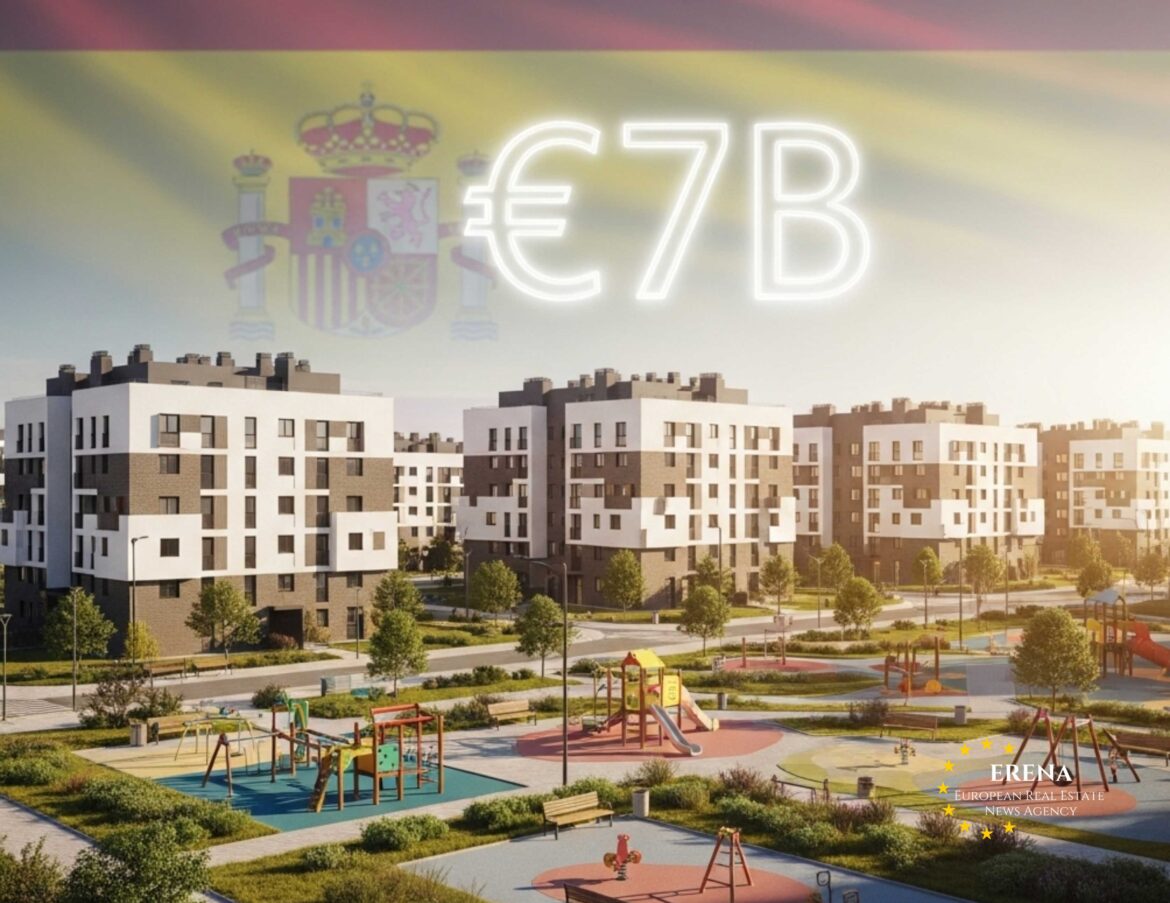Spanish Prime Minister Pedro Sánchez has unveiled an ambitious €7 billion plan to significantly expand the country’s social housing stock. The initiative is being framed as one of the government’s most comprehensive responses to Spain’s deepening housing affordability crisis, particularly affecting young families, low-income earners, and residents of major cities such as Madrid and Barcelona.
The program aims to dramatically increase the volume of public and subsidized housing in the coming years and bring Spain closer to the European average in terms of social housing provision. Currently, only about 2.5% of Spain’s housing stock qualifies as social housing, compared to more than 20% in countries like the Netherlands and Austria.
Why This Program Was Launched
Housing prices in Spain have soared in recent years, raising alarm among experts and public officials. According to the National Statistics Institute (INE), average housing prices have increased by over 25% in the last five years, while wage growth has remained modest. The problem is especially acute in tourist-heavy regions and large cities, where demand from foreign investors and the growth of short-term rental platforms like Airbnb have further tightened the long-term rental market.
Younger people, families with children, and the elderly are increasingly being priced out of the housing market. According to Eurostat, nearly 43% of Spaniards under the age of 35 still live with their parents—significantly above the EU average.
In this context, Sánchez’s government sees affordable housing as a pillar of its social policy agenda.
Key Elements of the Plan
The program includes the construction and acquisition of at least 183,000 housing units designated for social use. The project outlines the following strategies:
- Building new residential units on state-owned and municipal land
- Renovating and repurposing abandoned or unfinished buildings
- Purchasing homes from private developers to incorporate into the social housing stock
- Offering long-term rental schemes with purchase options for low-income groups
Of the €7 billion allocated to the initiative, approximately €4.5 billion will come from national funding, while the remaining €2.5 billion will be sourced from the EU’s NextGenerationEU recovery and resilience program.
Regional Implementation
The government intends to distribute housing projects across all autonomous communities, with priority given to regions suffering from acute housing shortages—such as Catalonia, Madrid, Valencia, Andalusia, and the Canary Islands. The plan allows for flexibility to adapt to local conditions, taking into account urban density, population figures, and unemployment rates.
Local municipalities will be granted streamlined authority to approve construction and manage permitting procedures more efficiently.
Role of the Private Sector
Although the project is primarily state-funded, the private sector will play a crucial role in execution. Numerous construction firms, architectural offices, and real estate developers are expected to bid on public tenders related to the housing expansion.
The plan also includes tax incentives and subsidies for private developers willing to designate a portion of their projects to social housing.
Goals and Expected Impact
The program aims to raise Spain’s social housing share from the current 2.5% to 5% by 2030. This would result in:
- Affordable housing access for over 500,000 people
- A reduction in social tensions in areas affected by soaring rents
- The creation of up to 80,000 construction-related jobs
- Reduced dependency on short-term rentals and speculative real estate activity
According to the Ministry of Transport, Mobility, and Urban Development, the project could generate up to €12 billion in broader economic impact through tax revenues, indirect investments, and increased consumer spending.
Criticism and Challenges
Despite widespread support from progressive parties and civil society organizations, the project has faced criticism. The conservative Popular Party (PP) has expressed concern over bureaucratic inefficiencies, labor shortages in the construction industry, and corruption risks in the awarding of contracts.
Some analysts argue that the plan fails to address deeper structural issues, such as the regulation of short-term rentals, speculative practices, and the need for broader market reforms.
Construction sector leaders have also warned of rising material costs and potential delays that could impact the schedule and final delivery prices of the housing units.
Support from the EU
The program has received endorsement from the European Commission, which sees housing policy as a vital component of the EU’s social agenda. According to Economy Commissioner Paolo Gentiloni, Spain’s initiative aligns with the principles of sustainable development and could serve as a model for other EU member states.
The additional funding from the NextGenerationEU framework further strengthens Spain’s position as a country that combines post-pandemic recovery with social inclusion.
Alignment with Broader Reforms
The expansion of the social housing stock is part of a broader reform package championed by the Sánchez government, which also includes:
- Tighter regulations on short-term vacation rentals
- Rent subsidies for young tenants
- Simplified mortgage access for first-time buyers
- Energy-efficiency upgrades for existing housing stock
Together, these measures aim to improve long-term housing stability and reduce wealth inequality across Spain.
Outlook and Conclusion
If the government meets its objectives, Spain could take a significant step toward building a more inclusive and resilient housing system. The €7 billion expansion of social housing would serve as both an economic stimulus and a meaningful social investment, improving the lives of hundreds of thousands of families.
Although the program is still in its early stages, its scale and strong political backing signal a serious commitment to resolving the housing crisis. In a context of inflation, urban strain, and post-pandemic challenges, affordable housing is no longer a luxury—it is a necessity. And Spain appears ready to act accordingly.

